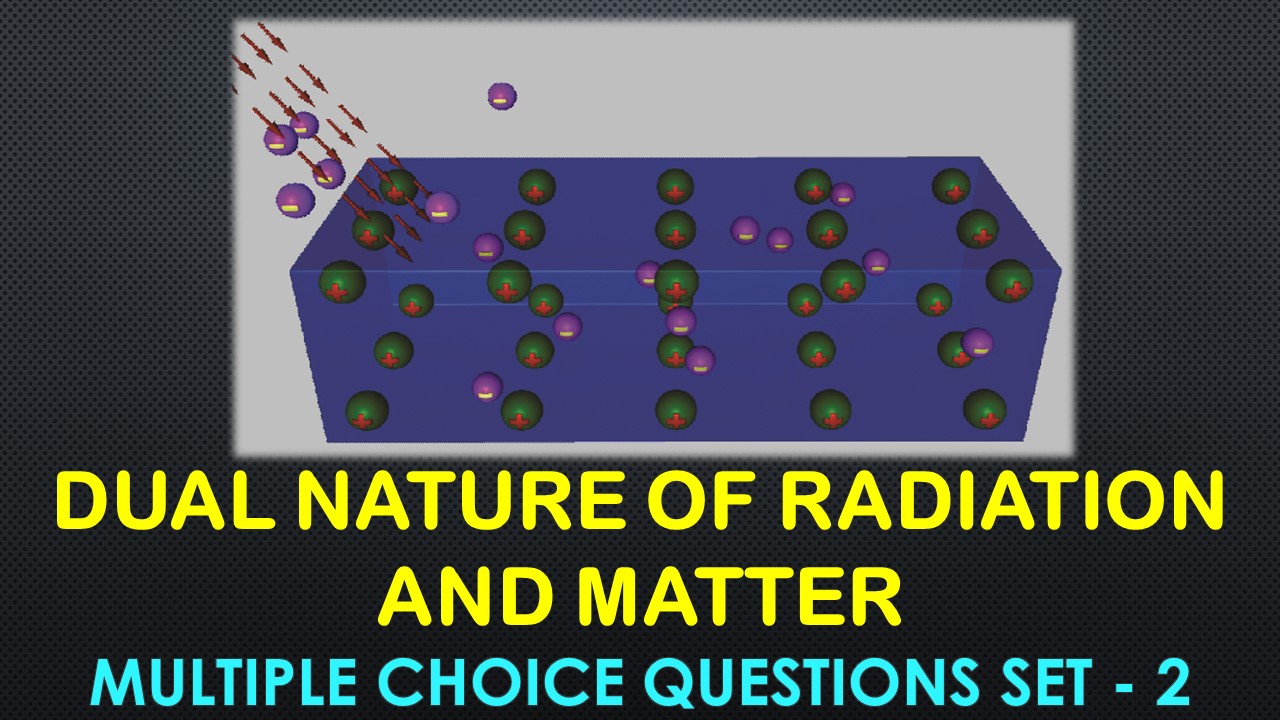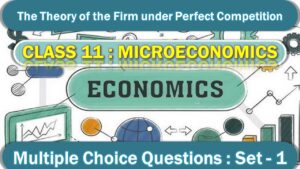CBSE Class 12 Dual Nature of Radiation and Matter Multiple Choice Questions with Answers. MCQ Questions Class 12 Dual Nature of Radiation and Matter with Answers Is Prepared Based on Latest Exam Pattern. Students can solve NCERT Class 12 Dual Nature of Radiation and Matter MCQs with Answers to know their preparation level.
Students who are searching for NCERT MCQ Questions for Class 12 Dual Nature of Radiation and Matter with Answers are compiled here to get good practice on all fundamentals. Know your preparation level on MCQ Questions for Class 12 Dual Nature of Radiation and Matter with Answers. You can also verify your answers from our provided MCQ Class 12 Dual Nature of Radiation and Matter with Answers. So, ace up your preparation with MCQ of Class 12 Physics Examinations.
MCQ Questions Class 12 Dual Nature of Radiation and Matter with Answers - Set - 2
Question 1:
The ratio of specific charge of an alpha particle to the proton is:
(a) 1 : 2
(b) 2 : 1
(c) 4 : 1
(d) 1 : 4
Correct Answer – (A)
Question 2 :
Protons and alpha particles have the same de-Broglie wavelength. What is same for both of them ?
(a) Energy
(b) Time period
(c) Frequency
(d) Momentum
Correct Answer – (D)
Question 3 :
The magnification produced by electron microscope is of the order of:
(a) 10
(b) 105
(c) 10³
(d) 107
Correct Answer – (B)
Question 4 :
The momentum of a photon is 10-27 kg ms-1. Its energy will be:
(a) 3 × 10-19 J
(b) 3 × 10-34 j
(c) 3 × 10-27 J
(d) none of these
Correct Answer – (A)
Question 5 :
When light is directed at the metal surface, the emitted electrons:
(a) are called photons
(b) have energies that depend upon the intensity of light.
(c) have random energies.
(d) have energies that depend upon the frequency of light.
Correct Answer – (D)
MCQ Questions Class 12 Dual Nature of Radiation and Matter with Answers
Question 6 :
Kinetic energy of emitted electrons depends upon :
(a) frequency
(b) intensity
(c) nature of atmosphere surrounding the electrons
(d) none of these
Correct Answer – (A)
Question 7 :
De-Broglie equation states the:
(a) dual nature
(b) particle nature
(c) wave nature
(d) none of these
Correct Answer – (A)
Question 8 :
With which of the following particles moving with same velocity de-Broglie wave length will be maximum?
(a) ß-particle
(b) ∝ particle
(c) electron
(d) Both A & C
Correct Answer – (D)
Question 9 :
The wavelength associated with n electron is 1Å. The potential difference required for accelerating it is
(a) 100 V
(b) 150 V
(c) 250 V
(d) 10³ V
Correct Answer – (B)
Question 10 :
The time required in emitting photo electrons is
(a) 10-8 s
(b) 10-4 s
(c) Zero
(d) 1 sec
Correct Answer – (C)
- NCERT Solutions Class 11 Chemistry Chapter 1 : Some Basic Concepts of Chemistry
- NCERT Solutions Class 11 Chemistry Chapter 2 : Structure Of The Atom
- NCERT Solutions Class 11 Chemistry Chapter 3 : Classification of Elements and Periodicity in Properties
- NCERT Solutions Class 11 Chemistry Chapter 4 : Chemical Bonding and Molecular Structure
- NCERT Solutions Class 11 Chemistry Chapter 5 : States of Matter
- NCERT Solutions Class 11 Chemistry Chapter 6 : Thermodynamics
- NCERT Solutions Class 11 Chemistry Chapter 7 : Equilibrium
- NCERT Solutions Class 11 Chemistry Chapter 8 : Redox Reactions
- NCERT Solutions Class 11 Chemistry Chapter 9 : Hydrogen
- NCERT Solutions Class 11 Chemistry Chapter 10 : The s-Block Elements
- NCERT Solutions Class 11 Chemistry Chapter 11 : The p-Block Elements
- NCERT Solutions Class 11 Chemistry Chapter 12 : Organic Chemistry: Some Basic Principles and Techniques
- NCERT Solutions Class 11 Chemistry Chapter 13 : Hydrocarbons
- NCERT Solutions Class 11 Chemistry Chapter 14 : Environmental Chemistry




